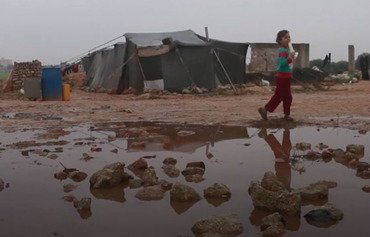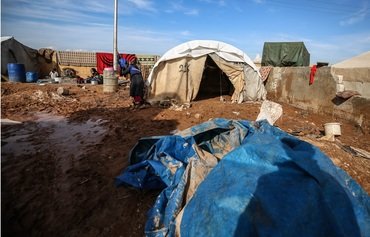Living conditions have further deteriorated for displaced families in the Idlib region since humanitarian and relief organisations left the area after security conditions made it impossible for them to operate, local activists said.
The advent of winter and lack of heating supplies has only made things worse, they said, noting that there is no chance of assistance from Tahrir al-Sham's so-called "salvation government".
The latest Syrian regime offensive has seen thousands more civilians take flight, leaving areas on the edge of the enclave for areas that are supposedly safer, Idlib activist Haisam al-Idlibi told Diyaruna.
More than 30,000 families are known to have fled in the latest wave of displacement, he said, noting that the vast majority of the most recently displaced have no access to tents or shelter.
![A truck transports a family fleeing the fighting to safer areas of rural Idlib. [Photo courtesy of Idlib Plus Facebook page]](/cnmi_di/images/2019/12/09/21275-Syria-Idlib-displacement-600_384.jpg)
A truck transports a family fleeing the fighting to safer areas of rural Idlib. [Photo courtesy of Idlib Plus Facebook page]
They have set up informal camps in agricultural fields and olive groves using whatever materials they were able to bring with them, he said.
Heavy civilian casualties
There has been an escalation in the direct targeting of civilians and a spike in the number of civilian casualties, forcing remaining residents to flee the area to escape the Russian and Syrian airstrikes and shelling.
These include an August 16th Russian airstrike on a housing complex in Haas that killed at least 20 civilians and injuring a further 52, and the November 21st bombing of a displacement camp in al-Qah, which killed 16 civilians.
Residents of the areas receiving the newly displaced are providing whatever assistance they have available, via independent local initiatives, said Saraqeb resident Mahmoud Abdel Nour.
The advent of winter portends "a major disaster for the majority of internally displaced persons (IDPs) in rural Idlib", he said.
Lacking means of heating and heating fuel, people are forced to burn anything they can find to provide heating for their children, he said, noting that some are burning trash, old shoes and wood they gather themselves.
Some families gather in one tent to get warm by burning whatever they can, he said, noting that with heavy rainfall, the camps flood and the tents are toppled.
Hostile climate for aid groups
Idlib activist Musab Assaf told Diyaruna he blames Tahrir al-Sham for creating a climate of instability in which humanitarian organisations are unable to operate.
This has compounded the suffering of the displaced population, he said.
The extremist alliance also has imposed taxes on aid and heating supplies, even as the Idlib population sinks deeper into poverty.
In large camps, such as Atma, an effort to distribute rations of coal for heating was suspended when Tahrir al-Sham demanded a 40% share of the total amount of coal allocated for the effort, he said.

![A displacement camp in northern Syria is flooded by rainwater. [Photo courtesy of Idlib Plus Facebook page]](/cnmi_di/images/2019/12/09/21274-Syria-Idlib-displacement-600_384.jpg)





